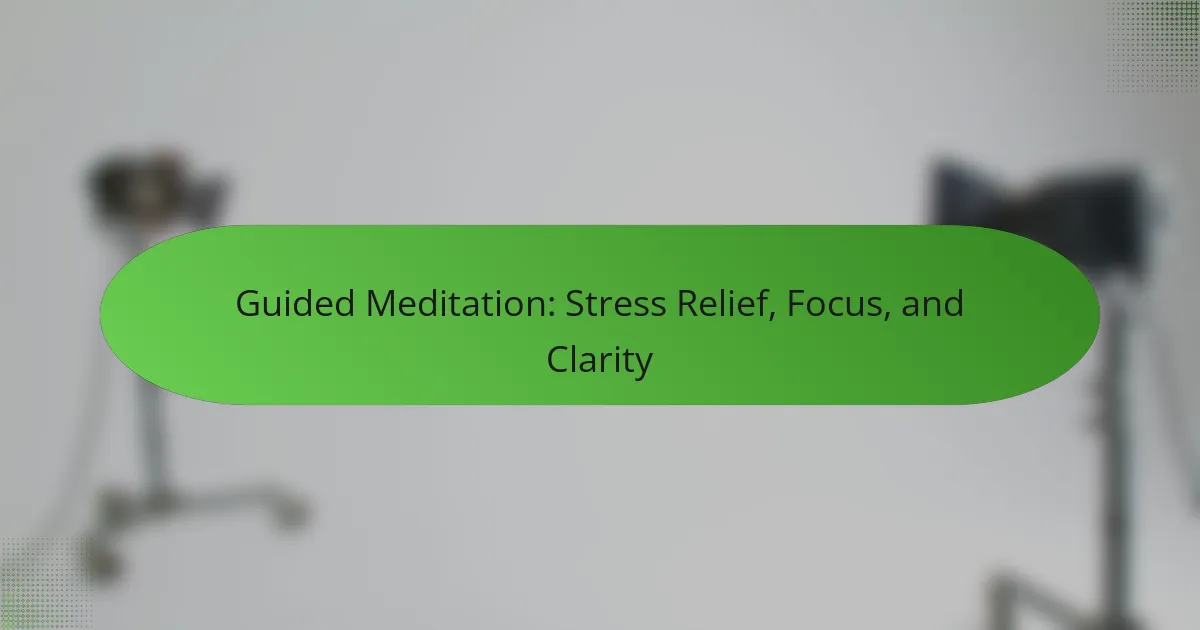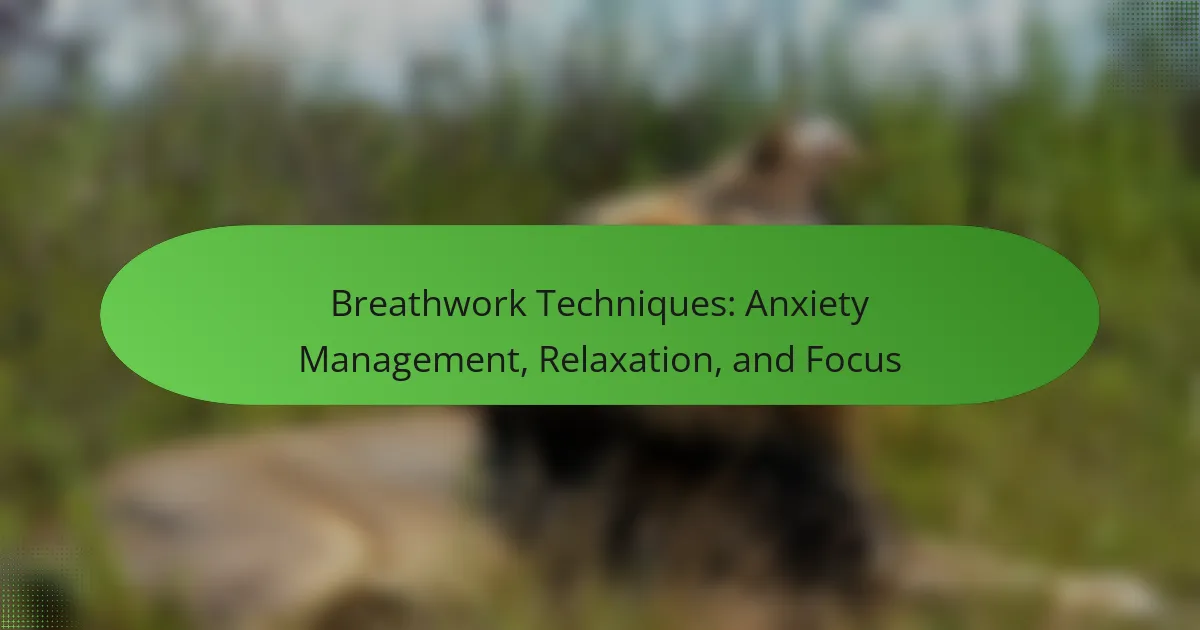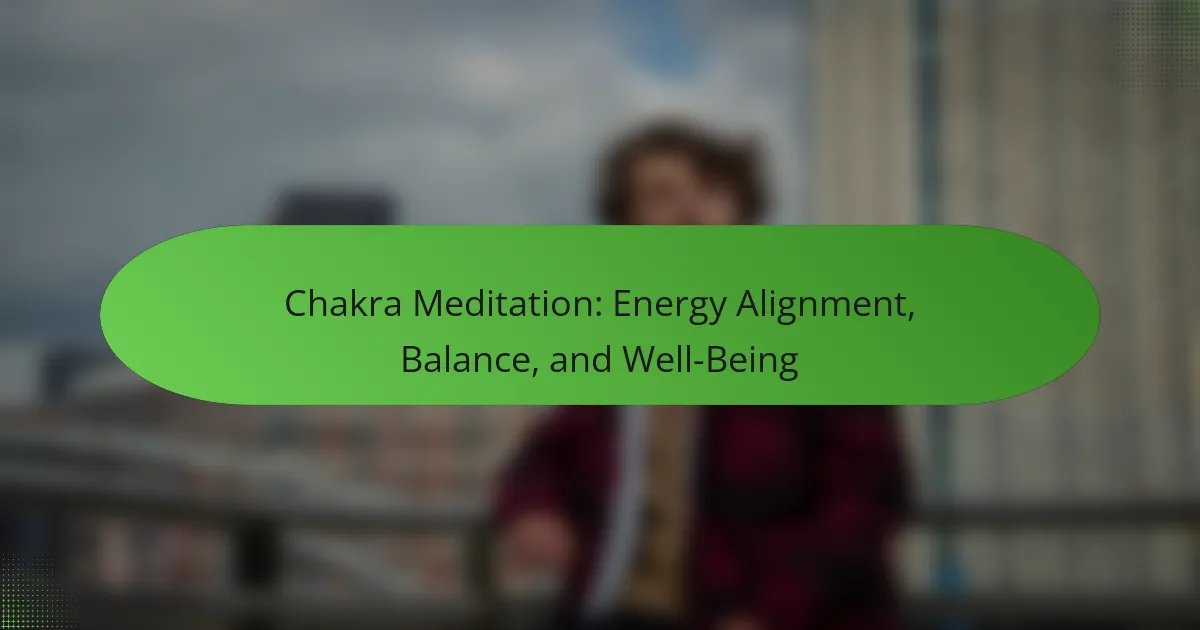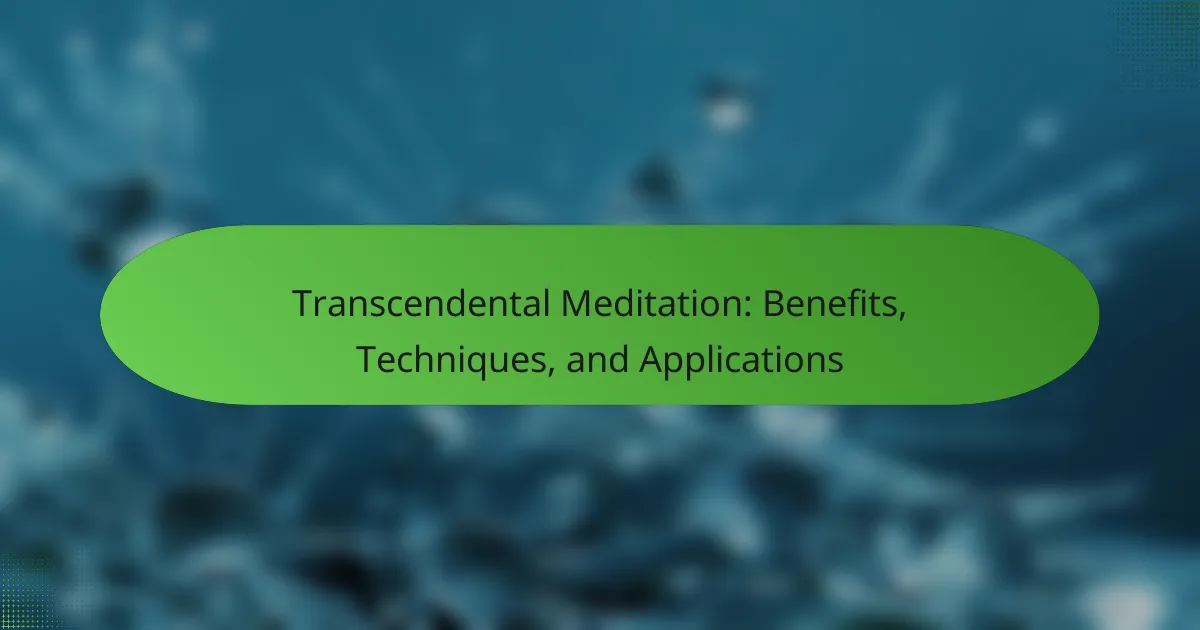Guided meditation serves as a powerful tool for stress relief, helping individuals to calm their minds and bodies through structured relaxation techniques. By incorporating practices such as mindfulness, breath awareness, and visualization, one can enhance focus and clarity while reducing anxiety. With various apps available, users can easily access tailored meditation sessions to support their mental well-being.
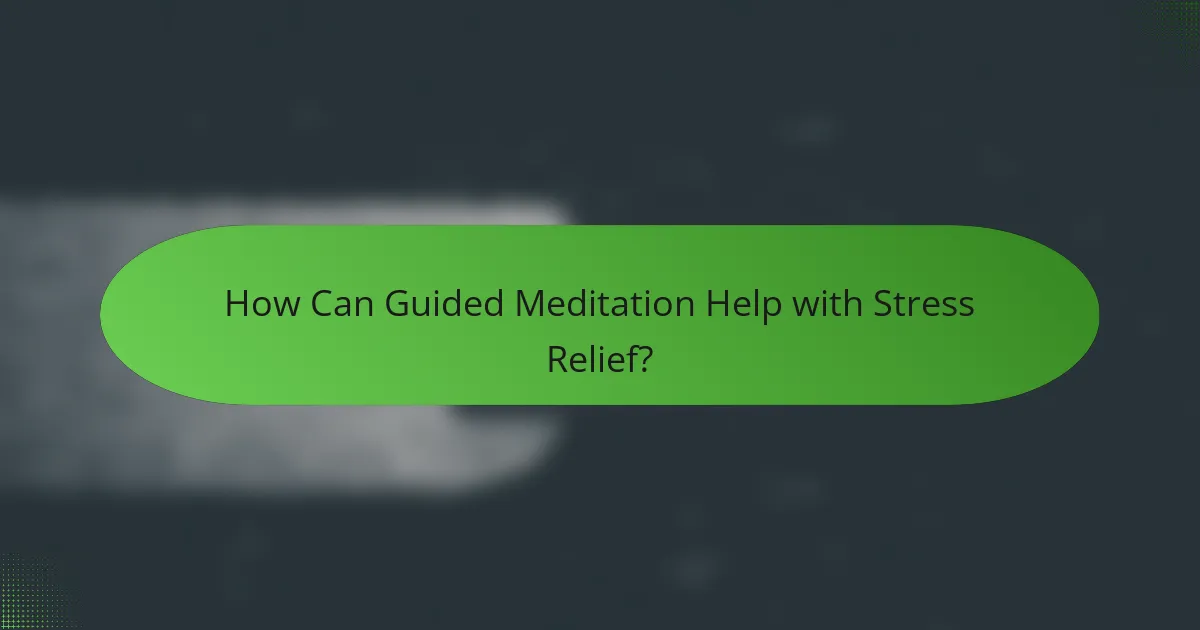
How Can Guided Meditation Help with Stress Relief?
Guided meditation can significantly alleviate stress by providing structured relaxation techniques that calm the mind and body. Through focused attention and deep breathing, individuals can reduce anxiety and enhance their overall sense of well-being.
Reduces cortisol levels
Guided meditation has been shown to lower cortisol levels, the hormone primarily responsible for stress. Regular practice can lead to a noticeable decrease in cortisol, helping to mitigate the physical effects of stress on the body.
Engaging in guided sessions for just 10-20 minutes a day can contribute to this reduction, making it a practical addition to your daily routine. Consider using apps or online resources that offer short, effective meditations tailored for stress relief.
Enhances emotional well-being
Participating in guided meditation can improve emotional health by fostering a positive mindset and reducing negative thoughts. This practice encourages self-awareness and emotional regulation, which are crucial for managing stress.
By focusing on gratitude and mindfulness during meditation, individuals can cultivate a more optimistic outlook, leading to better emotional resilience over time. Aim to integrate these themes into your sessions for maximum benefit.
Improves relaxation response
The relaxation response triggered by guided meditation counteracts the body’s stress response, promoting a state of calm. This physiological change helps lower heart rate and blood pressure, contributing to overall relaxation.
To enhance this effect, practice meditation in a quiet, comfortable space where you can fully focus on the guidance provided. Consistency is key; aim for daily practice to reinforce this relaxation response.
Increases mindfulness
Guided meditation enhances mindfulness, which is the ability to remain present and fully engaged in the moment. This heightened awareness can help individuals recognize stress triggers and respond more effectively.
Incorporating mindfulness techniques into your meditation can lead to improved focus and clarity in daily life. Try to practice mindfulness not only during meditation but also throughout your day, such as during meals or while walking.
Promotes better sleep
Guided meditation can significantly improve sleep quality by calming the mind and preparing the body for rest. By reducing stress and anxiety, it creates an optimal environment for falling asleep and staying asleep.
Consider using guided sleep meditations that focus on relaxation and visualization techniques. Aim to practice these sessions in the evening, ideally 30 minutes before bedtime, to help signal to your body that it’s time to wind down.
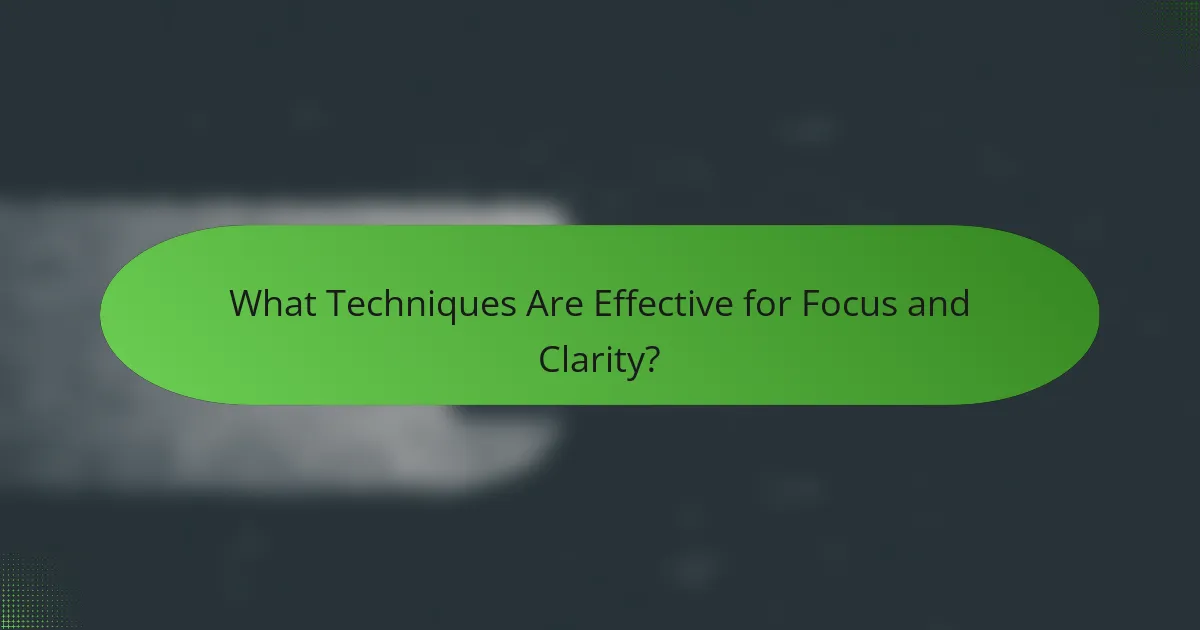
What Techniques Are Effective for Focus and Clarity?
Effective techniques for enhancing focus and clarity include mindfulness meditation, breath awareness, visualization techniques, and body scan meditation. Each method offers unique benefits that can help reduce stress and improve mental clarity.
Mindfulness meditation
Mindfulness meditation involves paying attention to the present moment without judgment. This practice helps cultivate awareness of thoughts and feelings, allowing individuals to observe distractions and refocus their attention. Regular practice can lead to improved concentration and reduced anxiety.
To begin, find a quiet space, sit comfortably, and focus on your breath. When your mind wanders, gently bring your attention back to your breath. Aim for sessions lasting between 5 to 20 minutes daily for optimal results.
Breath awareness
Breath awareness is a simple yet powerful technique that centers your focus on your breathing patterns. By concentrating on each inhalation and exhalation, you can calm your mind and enhance clarity. This practice can be done anywhere and is particularly effective in high-stress situations.
To practice, take a few moments to close your eyes and breathe deeply. Notice the sensation of air entering and leaving your body. Try to maintain this focus for 5 to 10 minutes, gradually increasing the duration as you become more comfortable.
Visualization techniques
Visualization techniques involve creating mental images to enhance focus and clarity. By picturing a desired outcome or a peaceful scene, you can train your mind to concentrate better and reduce stress. This method is often used by athletes and professionals to improve performance.
To practice visualization, find a quiet space and close your eyes. Imagine a scenario where you feel completely focused and clear-minded. Spend a few minutes immersing yourself in this visualization, engaging all your senses to make it as vivid as possible.
Body scan meditation
Body scan meditation is a technique that promotes relaxation and awareness by focusing on different parts of the body. This practice helps release tension and enhances mental clarity by encouraging a deeper connection with your physical state. It can be particularly beneficial for those experiencing stress or anxiety.
To perform a body scan, lie down comfortably and close your eyes. Start by focusing on your toes, gradually moving up through your body to your head. Spend a few moments on each area, noticing any sensations or tension. Aim for a session of 10 to 30 minutes to fully experience the benefits.
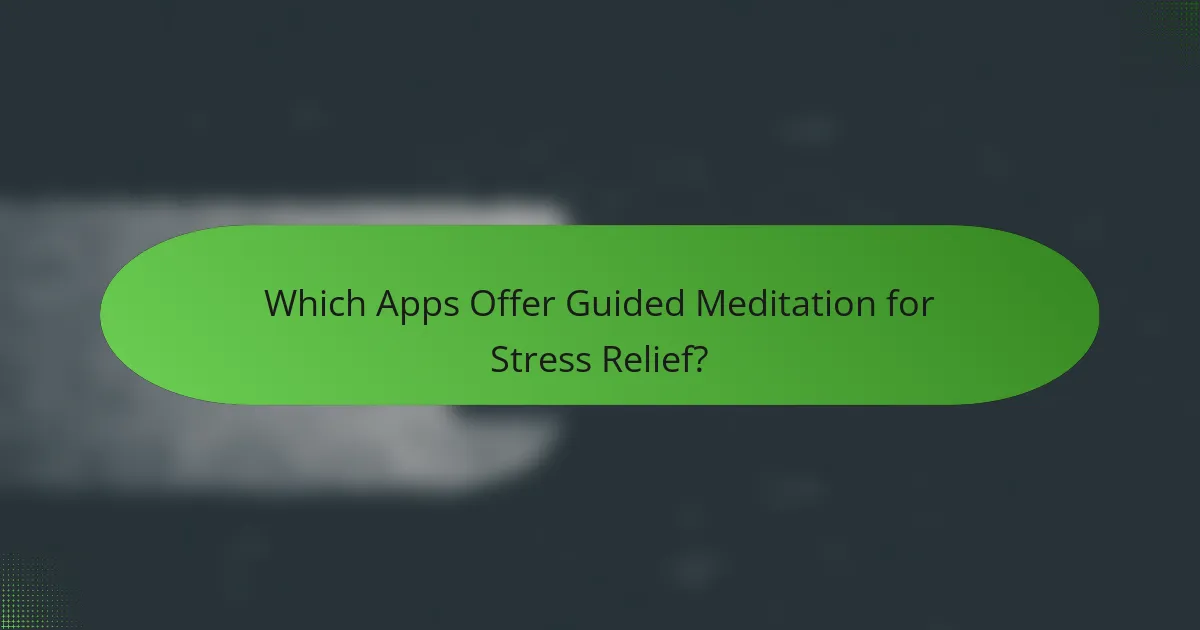
Which Apps Offer Guided Meditation for Stress Relief?
Several apps provide guided meditation specifically designed to relieve stress, improve focus, and enhance clarity. Popular options include Headspace, Calm, Insight Timer, and Simple Habit, each offering unique features and approaches to meditation.
Headspace
Headspace is known for its user-friendly interface and structured courses that cater to various levels of experience. It offers a range of guided meditations focused on stress relief, sleep, and mindfulness, making it suitable for beginners and seasoned practitioners alike.
With a subscription model, users can access hundreds of sessions, each lasting from a few minutes to over half an hour. The app also includes animations and articles to help users understand meditation concepts better.
Calm
Calm is another popular app that emphasizes relaxation and stress reduction through guided meditations, sleep stories, and soothing music. Its diverse content library allows users to choose sessions based on their mood or specific needs, such as anxiety or focus.
Calm offers both free and premium content, with premium subscriptions providing access to exclusive features like masterclasses and longer meditation sessions. The app’s calming visuals and sounds enhance the overall experience, making it a favorite for many users.
Insight Timer
Insight Timer stands out for its extensive library of free guided meditations, featuring contributions from various teachers worldwide. Users can explore thousands of sessions, ranging from just a few minutes to over an hour, focusing on stress relief and mindfulness.
This app also includes community features, such as discussion groups and the ability to connect with other meditators. While it offers a premium subscription for additional features, the free version is robust enough for most users seeking stress relief.
Simple Habit
Simple Habit is designed for busy individuals looking to incorporate meditation into their hectic schedules. The app features short, guided sessions that can be completed in as little as five minutes, making it easy to fit into daily routines.
With a focus on stress relief, Simple Habit offers themed meditations for various situations, such as work stress or preparing for sleep. A subscription unlocks additional content, but the free version provides ample resources for those just starting their meditation journey.
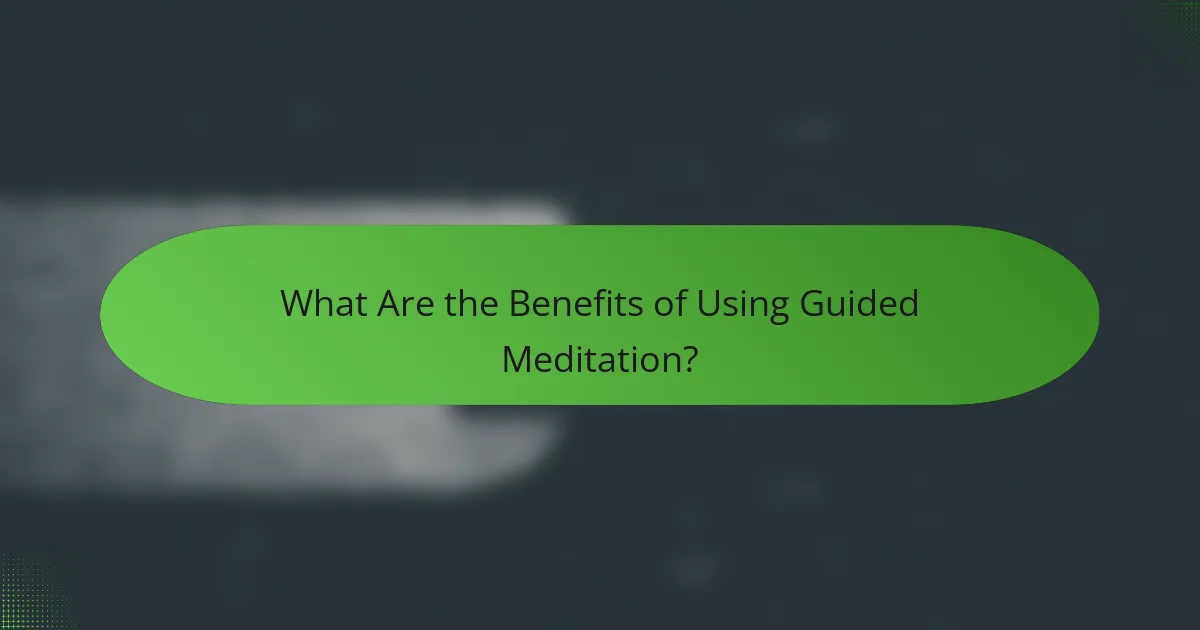
What Are the Benefits of Using Guided Meditation?
Guided meditation offers numerous benefits, including stress relief, improved focus, and enhanced mental clarity. By following a structured approach, individuals can effectively engage in meditation, making it easier to experience its positive effects.
Structured sessions
Guided meditation typically involves structured sessions that last anywhere from a few minutes to over an hour. This organization helps participants stay on track and ensures they cover essential aspects of meditation, such as relaxation and mindfulness. Many apps and online platforms provide timers and session outlines to aid in this structure.
By adhering to a set duration, individuals can gradually increase their meditation time, allowing for deeper practice without feeling overwhelmed. Beginners can start with shorter sessions, gradually extending them as they become more comfortable.
Expert guidance
One of the key advantages of guided meditation is the presence of expert guidance. Experienced instructors lead participants through various techniques, ensuring they understand how to meditate effectively. This guidance can include breathing exercises, visualization, and mindfulness practices tailored to specific needs.
Listening to a knowledgeable voice can enhance the meditation experience, providing reassurance and clarity. Many guided sessions are available through apps, podcasts, or online videos, allowing users to choose instructors that resonate with them.
Accessibility for beginners
Guided meditation is particularly accessible for beginners who may feel intimidated by traditional meditation practices. The step-by-step instructions help demystify the process, making it easier for newcomers to engage without prior experience. This accessibility encourages more people to try meditation, fostering a broader understanding of its benefits.
Many resources are available for free or at a low cost, making it easy for anyone to start their meditation journey. Beginners can explore various platforms to find sessions that suit their preferences and schedules.
Diverse meditation styles
Guided meditation encompasses a wide range of styles, including mindfulness, loving-kindness, and body scan techniques. This diversity allows individuals to find a method that resonates with their personal goals, whether they seek relaxation, emotional healing, or improved concentration.
Many platforms categorize sessions by style, duration, and intended outcome, making it simple to explore different approaches. Users can experiment with various styles to discover what works best for them, enhancing their overall meditation practice.
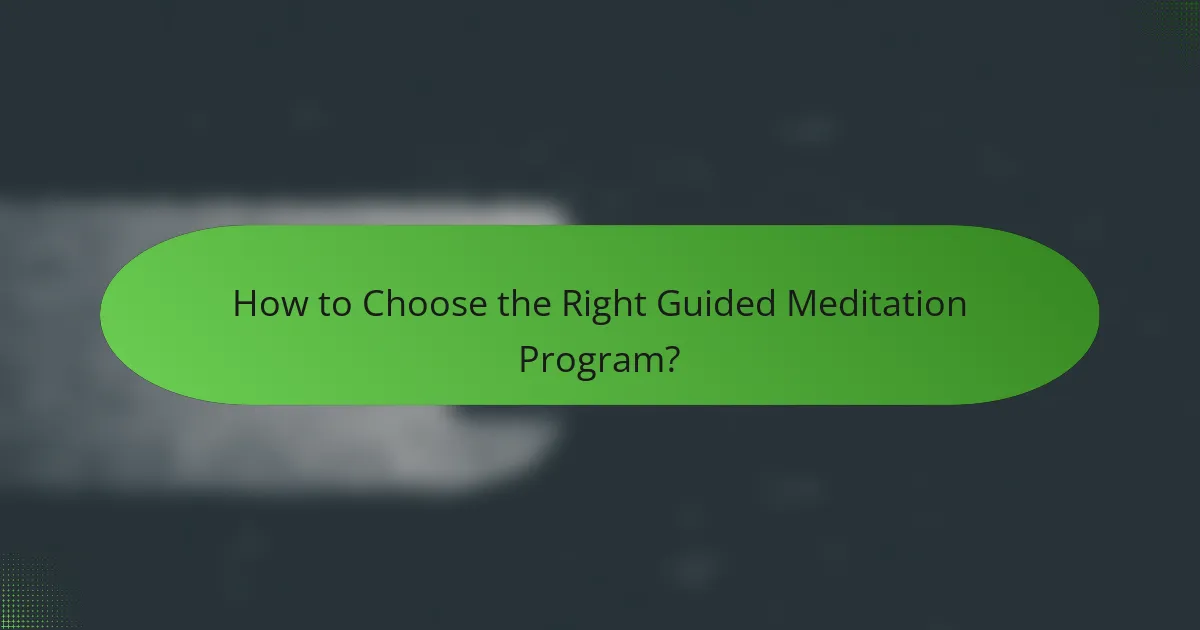
How to Choose the Right Guided Meditation Program?
Selecting the right guided meditation program involves understanding your personal needs and preferences. Consider your goals, the duration of sessions, and how often you plan to meditate to find a program that fits your lifestyle.
Identify personal goals
Start by clarifying what you want to achieve through meditation. Common goals include reducing stress, improving focus, or gaining mental clarity. Knowing your objectives will help you select a program that aligns with your aspirations.
For example, if your primary aim is stress relief, look for programs that emphasize relaxation techniques and mindfulness practices. Conversely, if you seek enhanced concentration, opt for sessions that focus on breath control and mental discipline.
Consider duration and frequency
The length of each meditation session and how often you practice are crucial factors. Many programs offer sessions ranging from a few minutes to over an hour. Choose a duration that fits comfortably into your daily routine.
Additionally, consider how frequently you can commit to meditation. Daily practice is ideal for building consistency, but even a few sessions a week can be beneficial. Establish a schedule that feels sustainable to ensure long-term engagement with the program.
